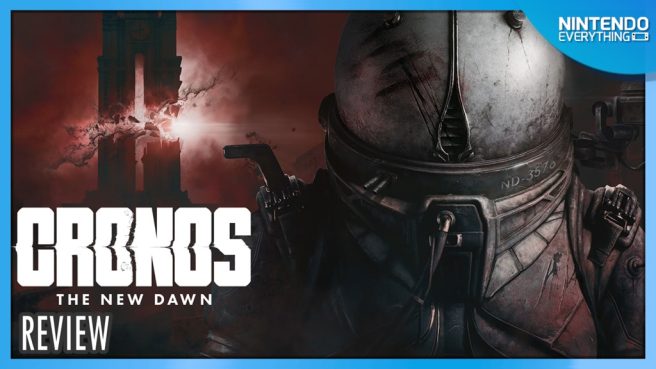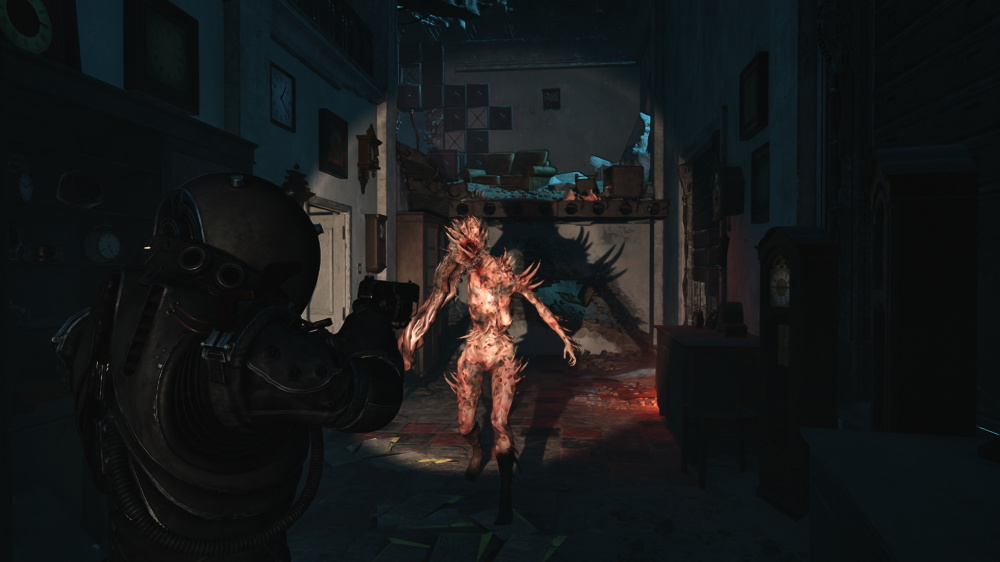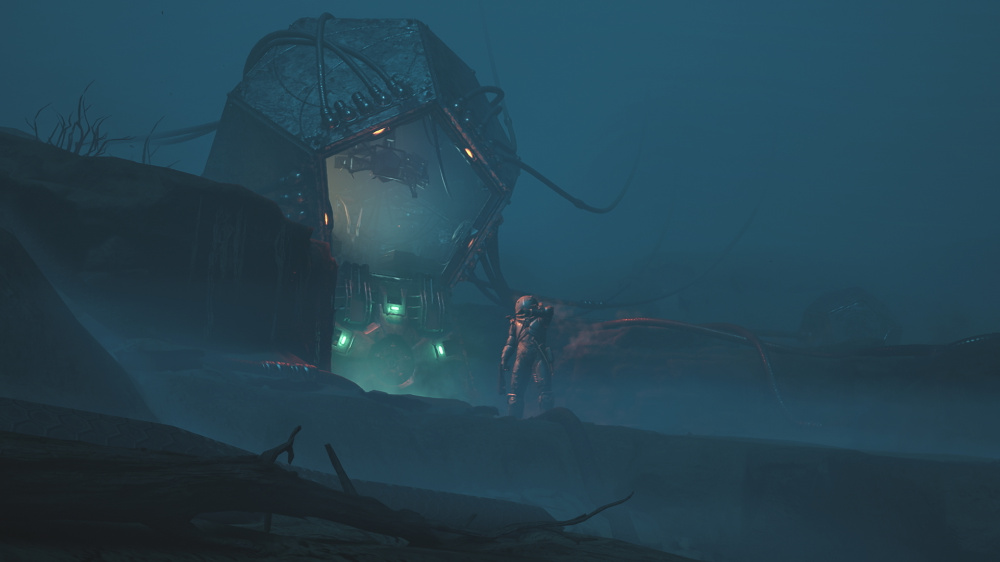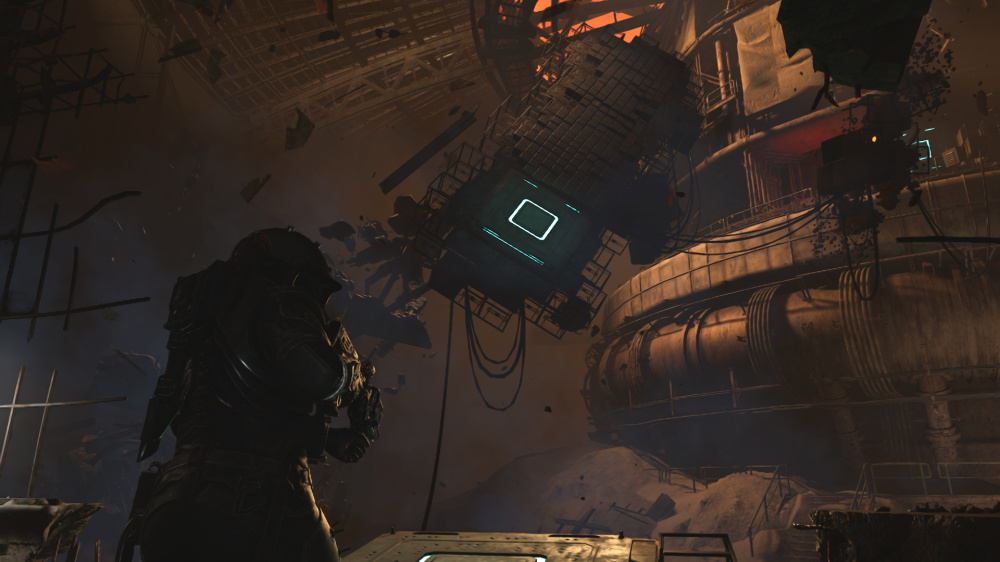Cronos: The New Dawn review for Nintendo Switch 2
System: Switch 2
Release date: September 5, 2025
Developer: Bloober Team
Publisher: Bloober Team
It’s always nice to play games that feel like a product of the people that made them, and to see complex cultural values and historical experiences reflected within the games we play. It’s even nicer to see these topics handled in a way that feels earnest, heartfelt, and naturally rooted in the onscreen fiction. The risk-averse confines of the AA and AAA ecosystem make it difficult for modern developers to sing from the heart in this regard, which is what makes Cronos: The New Dawn such an enticing prospect. Fresh off of their mainstream mega-success with a solid remake of Konami’s Silent Hill 2, Polish developer Bloober Team has bucked the idea of banking on the safety of sequels and remakes. Instead, they’ve opted to hard-launch an entirely new action-horror franchise. Not just any new franchise, mind – but one that’s so deeply rooted in modern Polish history that I came out the other end of my time with it wearing a zupan.
Cast a tertiary glance in Cronos: The New Dawn’s direction, and a lot of what makes it inherently interesting isn’t immediately apparent. Stepping into the steel-toed size 12’s of The Traveler, you third-person trudge your way through smoggy Unreal Engine 5-powered environments, blasting beasties that look like a cross between Dead Space 1’s enemies and.. er… Dead Space 2’s enemies. There’s audio logs to listen to, diaries to read, and graffiti splattered over cracked concrete facades that translates to some variation of “they didn’t listen to us!”. Scratch just one layer deeper though – spend just a few short minutes peering beneath the game’s overtly familiar veneer, and there’s a thoroughly worthwhile (and again, very Polish) tale to uncover within Cronos: The New Dawn.
Taking place in the Krakow of the far flung future, the game begins with you answering a brief set of Rorschach tests at the request of a cold and unscrupulous AI. The significance of this quick-fire psych assessment isn’t readily apparent, but then neither is much else as you begin your trek through post-POST-apocalyptic Poland. With your multiple-choice eval out of the way, you’re reminded of your responsibilities as The Traveler – to “pave the path” on behalf of The Collective, a shadowy clandestine group that exists only as a proper noun for a decent chunk of the game’s 16-ish hour runtime. Plenty of games in recent memory have opted to show and not tell when it comes to their narrative – FromSoftware is renowned for this approach – but it takes a particularly deft hand to tell whilst also not telling. It’s no small feat to pro-actively add layers of mystery to a game’s world without boring the hind legs off of the player or confusing them to the point that they mentally check out. Through Cronos’ opening hours, you’re given plenty of material to furnish your interpretation of its warped and wonderful world. Abundant audio logs and conveniently poetic diary entries are an over-used story-telling medium in games – sure – but it’s within these shreds of context where Cronos: The New Dawn comes alive.
As with any good post apocalypse, there has to be a right corker of a cataclysmic event that precedes it. Cronos’ own end of the world occurred smack bang in the middle of Soviet Poland, 1981. The Change, as it’s referred to, saw regular human beings develop a mysterious disease that resulted in them merging with one another – physically and mentally – into horrendous blobby mutants. Over the next few decades, this change extended to the world itself, fracturing the landscape into floating planes of misery that are equal parts treacherous/strikingly beautiful. There’s a not-so-subtle nod toward our own collective experience with the covid pandemic within Cronos, particularly around the nature of the fictional disease at its apocalypse’s core. The very nature of the illness being rooted in people coming together – literally – is a terrifying touch to both the game’s narrative, and to a lesser extent, its gameplay. Those aforementioned blobbers you’ll be coming up against can merge with the bodies of their fallen comrades, strengthening themselves in the process. “Don’t let them merge” has been a cornerstone of Cronos’ marketing in the run up to release – you’re urged to burn the remains of fallen foes to prevent their buddies from using them as an armored skin suit. The sad reality of the whole merging motif is that the mystery and weight it lends to the game’s narrative far outweighs the impact it has on its moment to moment gameplay.
This imbalance doesn’t stop there, either. Much like the hopeless plight of the game’s merged masses, it’s futile for me to sugar-coat how achingly Cronos’ wider gameplay loop fails in striking the same nerve as its immersive storytelling. Across almost every mechanic, Cronos: The New Dawn feels like it’s aiming for Dead Space, before unflatteringly landing somewhere in the region of Resident Evil 5 – it’s reliably standard in a way that feels Soviet-issued. Movement is laborious – your walking speed is comically slow, and running is more akin to an exasperated jog. Chronic I-told-you-so’s will counter this critique by stating that The Traveler is stomping about in a gigantic, hermetically sealed 1920’s diving suit. Fair, but it doesn’t change the fact that it simply feels awkward to control. The game’s suite of weaponry is equally sluggish and unsatisfying to wield. The go-to suite of handguns, shotguns, and automatic weapons are here to both shoot and upgrade, but doing the latter never felt like it made a tangible difference to my survival outcomes. Outside of combat, you’ll try your hand at rudimentary environmental puzzles that almost become interesting toward the tail end of the story – but these too ultimately fail to impress. If not for some incredible story-telling, Cronos: The New Dawn would be the generic gameplay equivalent of death by a thousand cuts.
As someone that typically values gameplay as the deciding factor in a title’s overall quality, I feel like I’m committing treason against my own head by considering Cronos as a success despite its shortcomings. It all comes back to the setting, its people, and the narrative. The Traveler, as a main character, is obtuse and awkward – an isolated and lonely figure stubbornly carving their way through a seemingly insurmountable set of obstacles. The struggle they endure is mirrored by the past experiences detailed through the game’s environmental storytelling. Stoic, Soviet-era martyrdom and selflessness is woven into not only the journals and audiologs discoverable within the world, but also The Traveler themselves, in the way they speak and the way they act. It’s this aspect specifically that carried me through the entire experience – as back-handed a compliment as that may be. It comes back to what I said at the outset of the review. Just like games like S.T.A.L.K.E.R and even Metal Gear, Cronos’s qualities are born from an intimate familiarity between the game’s creators and the ideals and cultural fixations that guide them. As the plot progresses, the isolationist mentality that governs The Traveler (and their leadership) is challenged in ways that are moving and heartfelt. Despite merging and coming together causing so much pain and turmoil within the world of Cronos – the core message is often that it’s always the better option.
In the midst of such an impactful and all-encompassing narrative, it feels somewhat clunky to talk about boss battles and collectibles – but they’re there, too. I haven’t even touched on the time traveling you’ll be doing either – but going into the game, I knew only as much as I’ve shared in this review and I think that’s key to getting the most out of Cronos.
The only other big elephant in the room is the technical performance on Nintendo Switch 2, and it’s a rough one folks. This is one of the first implementations of Unreal Engine 5 we’ve seen make its way to Nintendo’s new console, and I’m reminded of how Unreal Engine 4 games used to struggle on the original Switch. While the game can still look suitably atmospheric (particularly when you gaze out upon the limitless supply of wide, eerie Soviet vistas), it’s best enjoyed from a distance. Once you get close to any of the props, people or pustulent creatures, you’ll witness some of the most aggressive pop-in I’ve ever seen in a shipped, retail game. Lighting – a vital element in any horror title – can totally fall to pieces at points, too. There’s a visible radius around The Traveler as they move, outside of which the game’s indoor environments are garishly unlit. From a technical standpoint, okay – Unreal Engine 5 is notoriously heavy, and it’s impressive that Bloober has squished all of Cronos into 10 measly watts of power. Even so, I shouldn’t have to remind myself of that in order to excuse the game from frequently looking like someone verbally describing a budget PS2 title.
Ultimately, the enjoyment you extract from Cronos: The New Dawn will be entirely dependent on how much emphasis you’re willing to place on the game’s narrative. As a horror title, it’s not especially scary. As an action game, it’s clunky and unimaginative. As a story and a world however, it’s utterly engrossing – and the overall visual direction is often sublime. If the brilliance of Cronos’s earnest, grave and somber story-telling could have been married to a game with even half the same creativity, we would have a new all-time great on our hands. As it stands however, Bloober’s brand new franchise is extensively dulled by its archaic gameplay, and severe technical shortcomings on Nintendo Switch 2.
Cronos: The New Dawn copy provided by the publisher for the purposes of this review.




